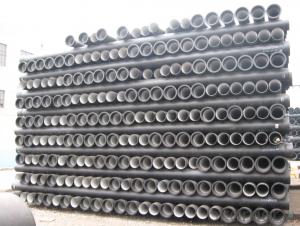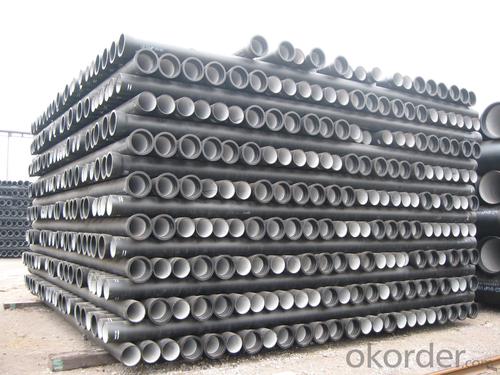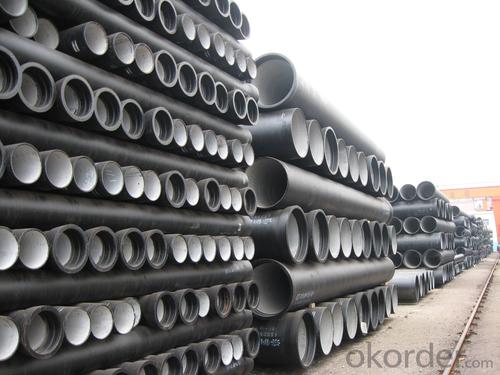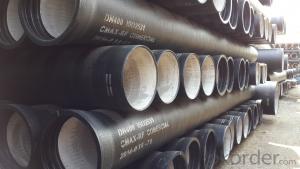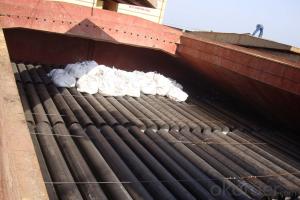Ductile Iron Pipe DN200
OKorder Service Pledge
Quality Product, Order Online Tracking, Timely Delivery
OKorder Financial Service
Credit Rating, Credit Services, Credit Purchasing
You Might Also Like
Specifications
Quick Details
| Place of Origin: | China (Mainland) | Brand Name: | CMAX | Model Number: | T type / K type / Flange type |
| Length: | 6m / 5.7m / Negotiable | Standard: | ISO2531 / EN545 / EN598 | Application: | Potable / Sewage water |
| Diameter: | DN80~DN2200 | Shape: | Round | Hardness: | 230 |
| Pipe Wall Thickness: | standard | Pull Strength: | 420 | Yield (≥ MPa): | 300 |
| Material: | Ductile Iron | Type: | Centrifugal ductile cast iron pipe | Certification: | ISO2531 / EN545 / EN598 |
| Outer Diameter: | 80-2200 | Thickness: | standard | Specification: | DN80~DN2200 |
| |
The advantages to the customer:
Trustworthy financial strength.
One-stop shopping.
Fast and efficient service.
Coordination of shipments from multiple plants.
Specialists of the overseas shipping process.
A more competitive price.
- Q: How does ductile iron pipe perform in high-temperature environments?
- Due to its unique properties and characteristics, ductile iron pipe performs exceptionally well in high-temperature environments. It is known for its high strength, toughness, and durability, making it suitable for various applications that involve elevated temperatures. One of the main advantages of ductile iron pipe in high-temperature environments is its ability to withstand thermal expansion and contraction. With a low coefficient of thermal expansion, the material can handle significant temperature fluctuations without suffering detrimental effects. This ensures that the pipe remains structurally stable, avoiding deformation or cracking when exposed to high temperatures. Moreover, ductile iron pipe exhibits excellent thermal conductivity, allowing it to efficiently transfer heat. This prevents the accumulation of excessive heat and reduces the risk of thermal stress. Additionally, its high thermal conductivity enables it to dissipate heat quickly, ensuring that the pipe remains within safe operating temperatures. Furthermore, ductile iron pipe has a high melting point of approximately 2200°F (1200°C). This characteristic guarantees that the pipe maintains its structural integrity even in extremely high-temperature environments, making it capable of effectively handling hot fluids, steam, and other substances at elevated temperatures without compromising performance. Another crucial aspect is the corrosion resistance of ductile iron pipe. It is commonly coated with protective linings, such as cement mortar or epoxy, which act as a barrier against corrosion caused by high temperatures. These linings prevent direct contact between the pipe and corrosive substances, thereby ensuring the pipe's longevity in high-temperature environments. In conclusion, ductile iron pipe is an excellent choice for high-temperature environments due to its exceptional strength, thermal stability, thermal conductivity, and corrosion resistance. Its ability to withstand thermal expansion, high melting point, and efficient heat transfer properties make it a reliable and durable option for various applications in such conditions.
- Q: Can ductile iron pipes be used in areas with high soil acidity?
- To ensure the durability and performance of ductile iron pipes in areas with high soil acidity, certain precautions should be taken. Ductile iron pipes are renowned for their strength, durability, and resistance to corrosion, making them suitable for various soil conditions, including those with high acidity. However, the presence of high soil acidity can still pose a potential risk to ductile iron pipes over time. Acidic soils can accelerate the corrosion process, leading to the degradation of the pipe material. To mitigate this risk, the following measures can be implemented: 1. Protective Coatings: Applying protective coatings, such as epoxy or polyethylene, to the outer surface of the pipes adds an extra layer of defense against soil acidity. These coatings act as a barrier, preventing direct contact between the pipe and the corrosive soil. 2. pH Adjustment: Adjusting the pH levels of the soil can help reduce its acidity. This can be achieved by incorporating lime or other neutralizing agents into the soil, creating a more favorable environment for the ductile iron pipes. 3. Cathodic Protection: Employing cathodic protection systems is an effective method to prevent corrosion in ductile iron pipes. This technique involves utilizing sacrificial anodes or impressed current systems to generate a protective electrical current that counteracts the corrosive effects of the soil. 4. Regular Inspections: Conducting periodic inspections is crucial to monitor the condition of the ductile iron pipes in high soil acidity areas. This enables early detection of any corrosion or degradation, facilitating timely repairs or replacements. By implementing these measures, ductile iron pipes can be effectively utilized in areas with high soil acidity, guaranteeing long-term performance and minimizing the risks associated with corrosive soils. However, it is advisable to consult experts or engineers familiar with local soil conditions and project requirements to determine the most suitable materials and protective measures.
- Q: Are ductile iron pipes suitable for potable water distribution systems?
- Yes, ductile iron pipes are suitable for potable water distribution systems. Ductile iron pipes have excellent corrosion resistance, high strength, and durability, making them a reliable choice for transporting drinking water. They are also widely used in water infrastructure due to their ability to withstand high pressures and external loads.
- Q: How do ductile iron pipes handle water hammer in high-rise buildings?
- Known for their durability and strength, ductile iron pipes are an excellent option for managing water hammer in high-rise structures. Water hammer, a common occurrence when water flow abruptly halts or changes direction in pipes, causes pressure surges that can strain and potentially harm the pipes. Engineered to withstand high-pressure scenarios, ductile iron pipes exhibit remarkable resistance to water hammer. With their high tensile strength, these pipes can endure sudden pressure changes without warping or fracturing. This feature is especially crucial in high-rise constructions where water distribution must accommodate various floor pressures. Furthermore, the outstanding corrosion resistance of ductile iron pipes bolsters their ability to handle water hammer. Over time, corrosion weakens pipes, making them more prone to failure during pressure surges. However, the corrosion resistance of ductile iron pipes guarantees their structural integrity even in high-pressure circumstances. Moreover, the flexibility of ductile iron pipes enables them to absorb and dissipate the energy generated by water hammer. Consequently, the overall system experiences minimal impact, reducing the potential for damage. Absorbing energy also contributes to minimizing noise and vibrations associated with water hammer, thus enhancing the efficiency and comfort of the water supply system. To summarize, ductile iron pipes are well-suited to manage water hammer in high-rise buildings. Their strength, corrosion resistance, and flexibility make them a reliable choice for delivering water under varying pressures while upholding the system's integrity.
- Q: How do ductile iron pipes handle soil movement?
- Ductile iron pipes are known for their excellent strength and durability, making them highly capable of handling soil movement. These pipes are designed to resist external loads and pressures caused by soil settlement, ground shifting, or other environmental factors. One of the key features of ductile iron pipes is their flexibility. Unlike rigid materials such as cast iron or concrete pipes, ductile iron pipes have a certain level of elasticity that allows them to withstand soil movement without cracking or breaking. This flexibility enables the pipes to absorb the stresses induced by the soil, preventing any significant damage to the pipeline system. Furthermore, ductile iron pipes possess high tensile strength, which means they can resist pulling forces resulting from soil movement. The pipes can withstand the expansion and contraction of the surrounding soil, reducing the risk of pipe deformation or failure. Moreover, ductile iron pipes are often installed with proper bedding and backfilling techniques to further enhance their ability to handle soil movement. Adequate bedding materials, such as crushed stone or sand, are used to provide stable support to the pipes and distribute the external loads evenly. This helps to minimize the impact of soil movement on the pipes and maintain their structural integrity. In summary, ductile iron pipes are designed to effectively handle soil movement due to their flexibility, high tensile strength, and proper installation methods. These pipes can withstand the stresses induced by soil settlement, ground shifting, or other soil-related factors, ensuring reliable and long-lasting performance in various environmental conditions.
- Q: Are ductile iron pipes suitable for use in wastewater pumping stations?
- Yes, ductile iron pipes are suitable for use in wastewater pumping stations. Ductile iron is a strong and durable material that can withstand the harsh conditions and corrosive nature of wastewater. It has excellent resistance to corrosion and can handle high-pressure environments, making it an ideal choice for transporting wastewater in pumping stations. Additionally, ductile iron pipes have a long lifespan and require minimal maintenance, reducing the overall cost of operation and ensuring reliable and efficient wastewater transportation.
- Q: Can ductile iron pipes be used for bridge drainage systems?
- Yes, ductile iron pipes can be used for bridge drainage systems. Ductile iron pipes are known for their strength, durability, and resistance to corrosion, making them suitable for various applications, including bridge drainage systems. They can effectively handle the flow of water and withstand the weight and pressure of vehicles passing over the bridge.
- Q: Can ductile iron pipes be used for potable water systems?
- Yes, ductile iron pipes can be used for potable water systems. Ductile iron is a strong and durable material that is resistant to corrosion and has been widely used in water distribution systems for many years. It meets the necessary standards and regulations for the transportation of potable water, making it a suitable choice for such applications.
- Q: Disadvantages of ductile iron pipes
- The strength of nodular cast iron is comparable to that of cast steel. Ductile iron has higher yield strength, the lowest yield strength is 40K, while the yield strength of cast steel is only 36k.
- Q: What is the expected pressure class for ductile iron pipes?
- The expected pressure class for ductile iron pipes typically falls within the range of Class 150 to Class 350.
Send your message to us
Ductile Iron Pipe DN200
OKorder Service Pledge
Quality Product, Order Online Tracking, Timely Delivery
OKorder Financial Service
Credit Rating, Credit Services, Credit Purchasing
Similar products
Hot products
Hot Searches
Related keywords


